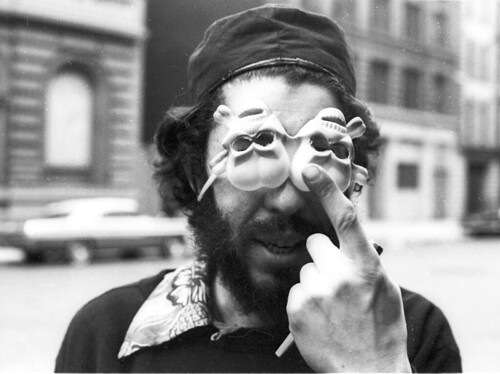 Scott Rettberg Barney Rosset at the offices of the Evergreen
Scott Rettberg Barney Rosset at the offices of the Evergreen
Review, 2001The East Village has lost a legend of letters. Barney Rosset, who championed avant-garde literature and defended first amendment rights as the owner of Grove Press, is dead at the age of 89, per an AP report. The crusading publisher – who more recently operated the Evergreen Review with his fifth wife, Astrid Myers, out of their fourth-floor walk-up near Cooper Square – died in a hospital on Tuesday night.
As documented in a two–part profile at the Los Angeles Review of Books, the Chicago native acquired Grove, then a reprint press, for $3,000 in 1951 and sold it to Ann Getty (only to be ousted from the company) for $2 million in 1986. During that time, he published a who’s-who of cutting-edge authors, introducing American audiences to literary trailblazers such as Samuel Beckett. His list included Jean-Paul Sartre, Allen Ginsberg, Eugene Ionesco, Che Guevara, Malcolm X, Octavio Paz, Pablo Neruda, Jean Genet, Frantz Fanon, Alain Robbe-Grillet, and the Marquis de Sade, to name just a few.
As documented in a 2008 movie about his groundbreaking censorship battles, “Obscene,” he fought in court to print uncensored versions of D.H. Lawrence’s “Lady Chatterley’s Lover,” Henry Miller’s “Tropic of Cancer,” and William Burroughs’s “Naked Lunch.” Read more…
 Bob Simmons Tuli Kupferberg
Bob Simmons Tuli KupferbergThe funniest part of reminiscing about the uber-subversive East Village Other for The New York Times is that the latter set me on the road to rebellion before the former was even founded in 1965. I’m told I was reading by age four and within a few years the first section I grabbed when the Sunday Times arrived every weekend was the Book Review. The Grove Press ads kidnapped my imagination: Who was this Alain Robbe-Grillet guy and how do you pronounce his name? Why was William Burroughs considered so dangerous and did his characters have meals while wearing no clothes? And speaking of clothes, how come the girls on Grove’s covers wore so little?
Obviously my nascent libido was ready for plucking, but my fascination was not simply sexual. I wanted to know why in the land of the First Amendment some had wanted to ban these books.
I bought my first issue of the Village Voice in February 1966; it contained an obituary of the abstract expressionist Hans Hofmann. Already a Dylan fan, I scanned the ads for folk clubs and was absolutely smitten by bohemia. The first girl who won my heart in elementary school was Jessica Hentoff (I don’t recall my feelings being reciprocated) and her father Nat wrote for the Voice. Soon I picked up the Voice’s competitor, The East Village Other.
No friends’ parents wrote for EVO. Scruffier, funnier and dirtier than the Voice, EVO was not simply about bohemia, it was an anarchist’s bomb in newsprint hurled at the bourgeoisie. Even at my tender age, I knew that I didn’t like the world that grown-ups had created. The troublemakers at The Other were expressing themselves in ways I could only daydream about at that point. Read more…






